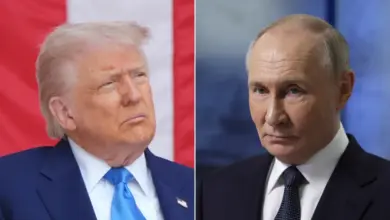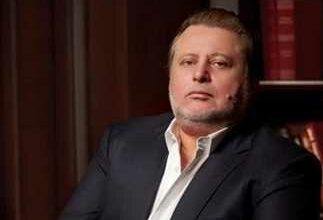
Widely considered a man who needs no introduction, world-renowned MIT linguist and leftist intellectual, Noam Chomsky, who is famous for his harsh criticisms of US foreign policy, visited Egypt this week for the first time since 1993 to give a talk Tuesday at the American University of Cairo.
A diverse crowd of academics, politicians, activists, AUC students, and journalists gathered to hear Chomsky speak on “Emerging World Order and the Arab Spring.” Among the crowd was Egyptian politician Amr Moussa and revolutionary activist Alaa Abdel Fattah.
A linguist by profession, Chomsky introduced himself Tuesday night by stating that his desire to follow politics closely and share his analyses stems out of a genuine concern about “the world we are bequeathing to our children and grandchildren.”
“It’s not a pretty picture,” he said, predicting that nuclear war and environmental disaster will be two of the most pressing issues future generations will face. According to Chomsky, nuclear war is already and has long been imminent, and environmental concerns are on the horizon as humanity desperately continues to sacrifice the environment for short-term energy gains.
The 84-year-old has been giving similar variations of Tuesday’s talk around the world since the Middle East uprisings took a firm hold in early 2011.
In a nutshell, the talk — whose narrative seemed disjointed at times, perhaps due to Chomsky’s attempt to tackle too many issues in a short time in front of such a diverse audience — argued that the US has had a deliberate interest in establishing global hegemony through military power since World War II and discussed how events like the Arab Spring threaten such interests, as well as how the US responds to such threats and how its responses affect the world.
Chomsky argued that many US wars as well as the recent global economic crisis, both of which he tied to the risks of nuclear war and environmental collapse, are connected to US attempts to maintain such control.
He also continually criticized the US and Israel during his talk as prime examples of countries that deliberately breach international peace treaties, such as supplying arms to states that use them to violate human rights, to maintain their own interests.
More comprehensively, Chomsky argued that World War II strengthened the US economically and politically, and that President Franklin Roosevelt's government used this outcome to achieve global hegemony through military superiority in the post-war world for its own interest. Citing various studies and journals, as well as quoting politicians and historians, he said that the US reached its power peak after the war and that its end goal was simply military control over the globe.
Chomsky argued that the US has been declining politically and economically since the 2008 economic crisis, but added that the decline has been decades in the making as various countries have slowly undermined US hegemony, such as the Soviet Union, China and, more recently, countries in South America and the Arab world.
Chomsky also argued that the US media recast American attempts to thwart its decline as efforts to "retain stability," which he described as synonymous with “maintaining conformity to US demands,” and added that such a narrative is used justify the US and Israel’s continuous breaching of international peace treaties.
Nonetheless, Chomsky argued, an essential part of US efforts to maintain global hegemony revolves around supporting dictators who are able to control and suppress any anti-US public opinion.
“Movements to independence and democracy are the biggest threat to [these efforts],” he said. “US foreign policy and control interests rely on dictators that ensure that public opinion does not democratically manifest in policy,” he said, adding that public opinion is usually in conflict with US interests.
He described the formula for US foreign policy in dealing with a dictator whose power is being threatened, which he says is to “support [the dictator] as long as possible.” But confronted with a situation such as the military turning against Mubarak in Egypt, the US then sends out ringing declarations supporting democracy and public opinion, and then soon after tries to work with successive governments and politicians to ensure that the old regime structure stays intact.
During his AUC talk, Chomsky didn’t give specific examples; however in an Egypt Independent interview with Chomsky at the end of 2011, he cited many examples of this formula from the past, including Marcos in The Philippines, Chun in South Korea and Suharto in Indonesia. “That the same procedure was followed in the case of Mubarak should surprise no one,” he said at the time.
Chomsky further explained in his speech Tuesday that in countries where direct interests are severely threatened, such as in the Gulf with Saudi Arabia and Bahrain, the US ensured that uprisings were impossible and immediately shut down. However, with Egypt or Tunisia, the US was forced to give the appearance of leeway and democratic support.
But Chomsky insisted that even with the Muslim Brotherhood taking control of Egyptian politics, the US will pressure the organization to adopt the same neoliberal policies as Mubarak, lest the US oppose them otherwise.
“Egyptian democracy will be supported as long as it stays in line with US interests,” he says.
With regards to Iran and the looming fear of nuclear war, Chomsky said that a very simple solution involves making the Middle East a nuclear weapon free zone. However, he insisted that despite this solution being supported by many countries around the world, including Egypt, the notion is being ignored by US media.
Chomsky loosely tied this idea into his theories of propaganda and “manufacturing consent” among an accepting population, saying that the American public remains largely removed from the global narrative on issues pertaining to US foreign policy. He explained that corporations, who benefit from global hegemony, are very deeply in control of US politics and have significant control over foreign policy and the media narrative, turning US politics into a sort of plutocracy. In a nutshell, he says that an inactive and lazy population allows propaganda to work very efficiently and, in America, is "shredding the remnants of political democracy" in the process.
The talk ended rather abruptly, with Chomsky stating that it is only through the defiance of such strategies, through mass and public protests such as those seen in Tahrir, that countries can retaliate against plutocratic or autocratic control and deter US global hegemony.
The question and answer session that followed the talk was disappointing, as questions were privately submitted and selected by AUC in advance. An off-point and generic session resulted, with questions such as, "What is the solution to Syria?" to which Chomsky answered, “I don’t know.”
Before making his appearance at AUC, Chomsky visited Gaza last week, where he called for an end of the Israeli blockade, and praised the Palestinian people for their perseverance. While in Gaza, he voiced opposition to calls for an academic boycott of Israel on the grounds that it would “strengthen support for Israel and US policy.”
Chomsky’s visit to the region was met with mixed reactions on both the Internet and in news journals. One person online called Chomsky an anti-Semitic genocide relativist, despite the fact that Chomsky was born Jewish and suffered from anti-Semitism in his youth. Another online commenter reminded readers that Chomsky was denied entry into Israel in 2010 to give a talk, but allowed into Gaza, concluding: “Who’s more democratic now?”




